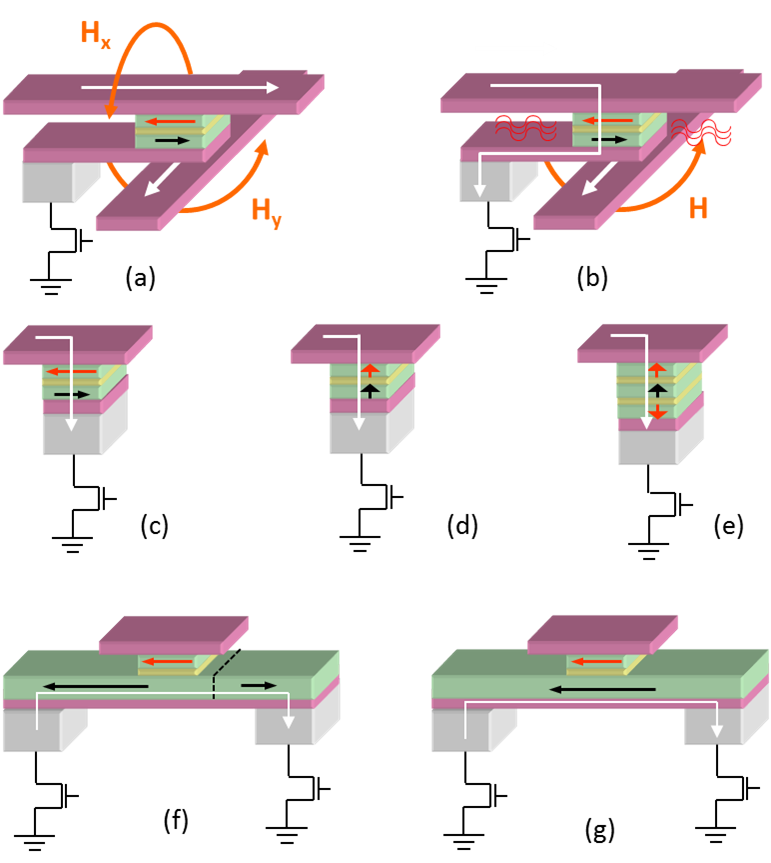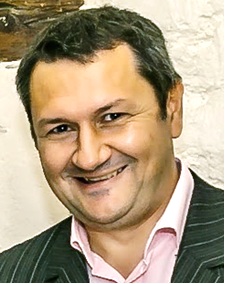Thematic overview
Magnetic Random Access Memories (MRAM) is a non-volatile memory technology, where information is stored by the magnetization direction of magnetic electrodes, very similar to computer hard-disk drives. The goal for MRAM memory is to simultaneously achieve high-speed read/write times, high density and unlimited cycling compared to other existing and emerging technologies.
Our group is developing advanced MRAM cell concepts patented at Spintec. The concepts are based on the use of temperature to reduce power consumption and increase the stability of the stored information. These ideas go beyond the conventional MRAM approach. The naturally occurring temperature increase during the write step is not lost, but is instead used to achieve the seemingly opposing goal of lowering the power consumption and increasing the thermal stability in the operating temperature range. Our group fosters young and experienced researchers developing/applying their expertise in the field of MRAM.

Questions to be addressed
Our main research axis is to use the naturally occurring temperature increase during the write step, when a current flows through the magnetic tunnel junction. The heating is used to go above a temperature threshold, making it possible to write the storage layer magnetization. This principle has been applied to in-plane magnetization cells using a storage layer pinned by an anti-ferromagnet and recently to perpendicular anisotropy cells. Our group’s goal is to demonstrate the proof-of-concept and then improve MRAM cell properties.
Our work involves the development of magnetic material systems, nano-fabrication (20-200nm cells), characterization of devices (magnetic & electrical) and simulation of the device behavior. Our activity in these vast fields is as follows;: On materials research, we are developing magnetic tunnel junctions with in-plane and perpendicular magnetic anisotropy. New electrode stacks having the material properties required by each specific concept need to be integrated in magnetic tunnel junctions, while achieving high levels of TMR signal. For the characterization of each concept we determine the write window parameters in terms of magnetic field, power consumption and magnetization reversal dynamics. Macrospin and micromagnetic simulation provide a better physical understanding of the system properties and the possibilities for optimization.
Projects
ANR EXCALYB – Perpendicular Anisotropy Materials for High-Density Non-volatile Magnetic Memory Cells
Crocus R&D – Thermally assisted MRAM
Samsung SGMI
Partners
Crocus Technology
Institut Néel
SP2M/NM
SAMSUNG
Applied Materials
SINGULUS
Recent news
- [POSITION FILLED] Post-doctoral position – TEM magnetic haracterization of MRAM devices [November 20th, 2018]
We are looking for a post doctoral researcher to work on a project focused on measuring the magnetic fields and their stability in magnetic memory devices. The candidate will act as the liaison between Spintec ... - PhD defense – « Study and optimization of thermal stability and temperature dependence of P-STTMRAM for industrial applications. » [November 20th, 2018]
On Wednsday 5 december, Luc TILLIE defends his PhD at 14h00 in room Chrome 1 of Maison Minatec – 3, Parvis Louis Néel, 38054 GRENOBLE Cedex . Luc TILLIE, will defend his thesis, jointly carried out ... - Seminar – “Normally-off“ Computing for Smart Systems [November 15th, 2018]
On december 05, We have the pleasure to welcome professor Lionel TORRES from Polytech Montpellier, Université de Montpellier. He comes at Grenoble for the PHD defense of Luc TILLIE at 14H. He kindly takes this ... - Efficient microwave amplification by heat modulation at GHz frequency in spintronics oscillators [November 13th, 2018]
Due to the nanometer size of magnetic tunnel junctions and high interfacial resistance of ultrathin MgO tunnel barriers, temperature modulation at GHz frequency can be achieved in these devices and efficiently use to amplify microwaves ... - Impact of intergrain effective coupling due to huge thermal gradients in heat assisted magnetic recording [November 12th, 2018]
Heat assisted magnetic recording (HAMR) is a new hard disk drive (HDD) recording technology which uses a temporary near field heating of the media during write to increase hard disk drive storage density. It has ...

SOUSA Ricardo
ricardo.sousa@cea.fr

BALTZ Vincent
vincent.baltz@cea.fr

PREJBEANU Lucian
lucian.prejbeanu@cea.fr

DIENY Bernard
bernard.dieny@cea.fr





